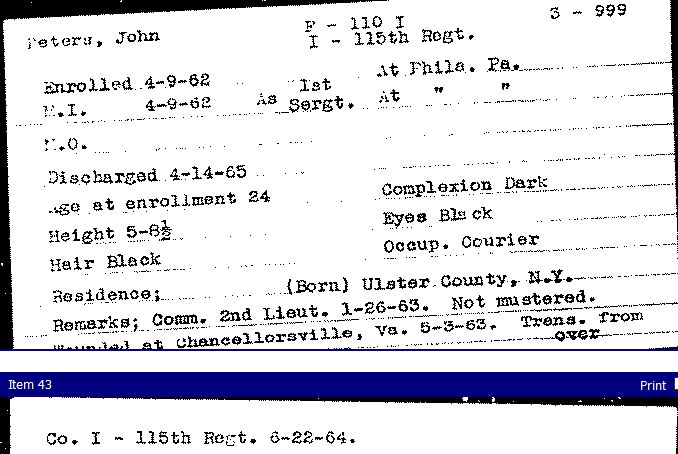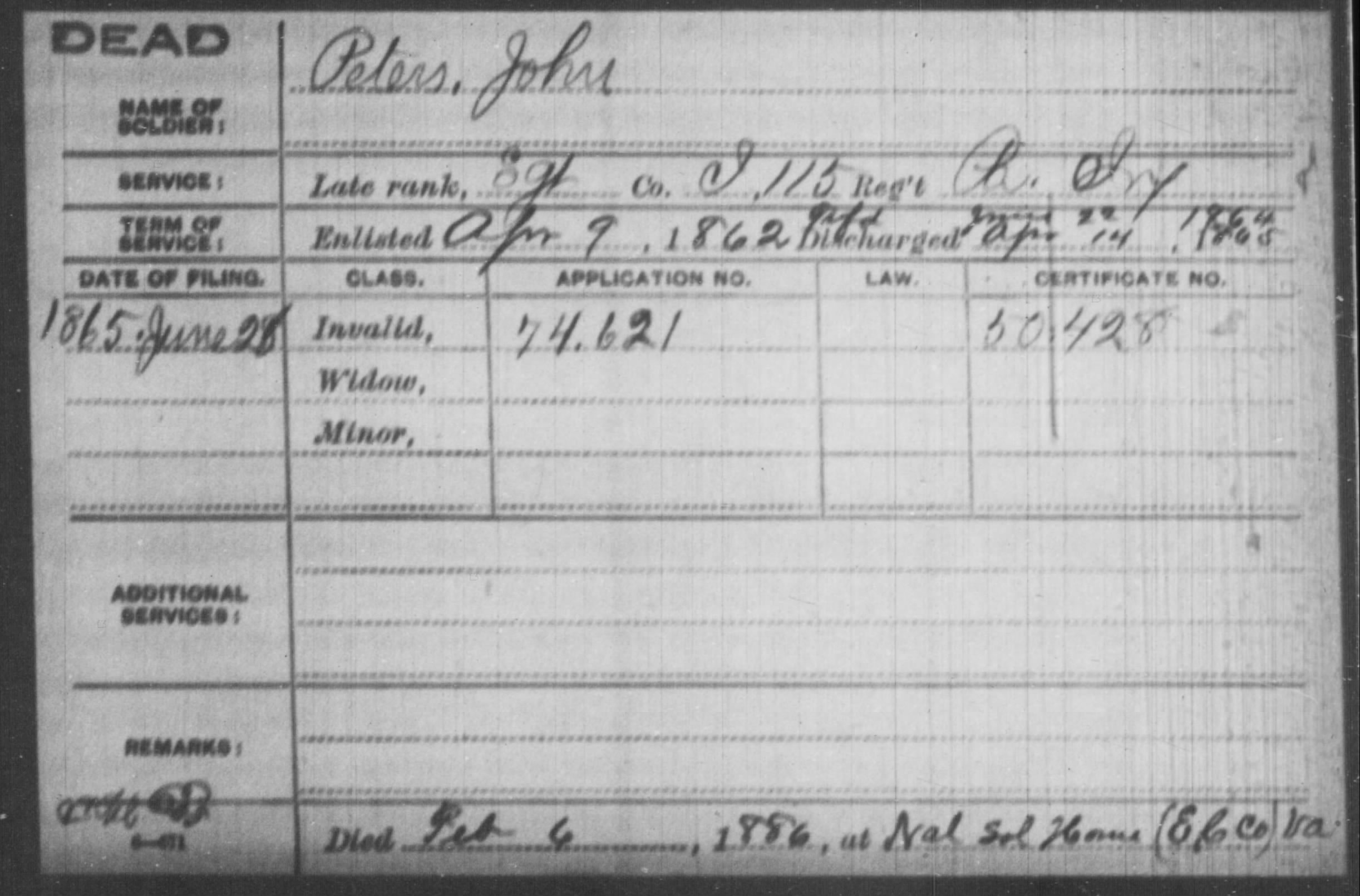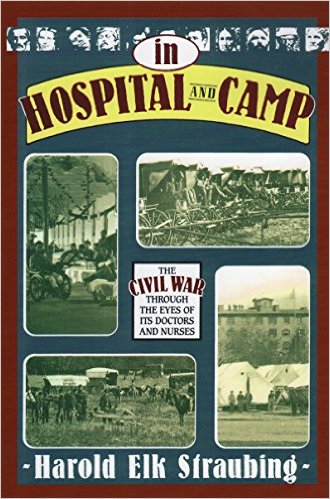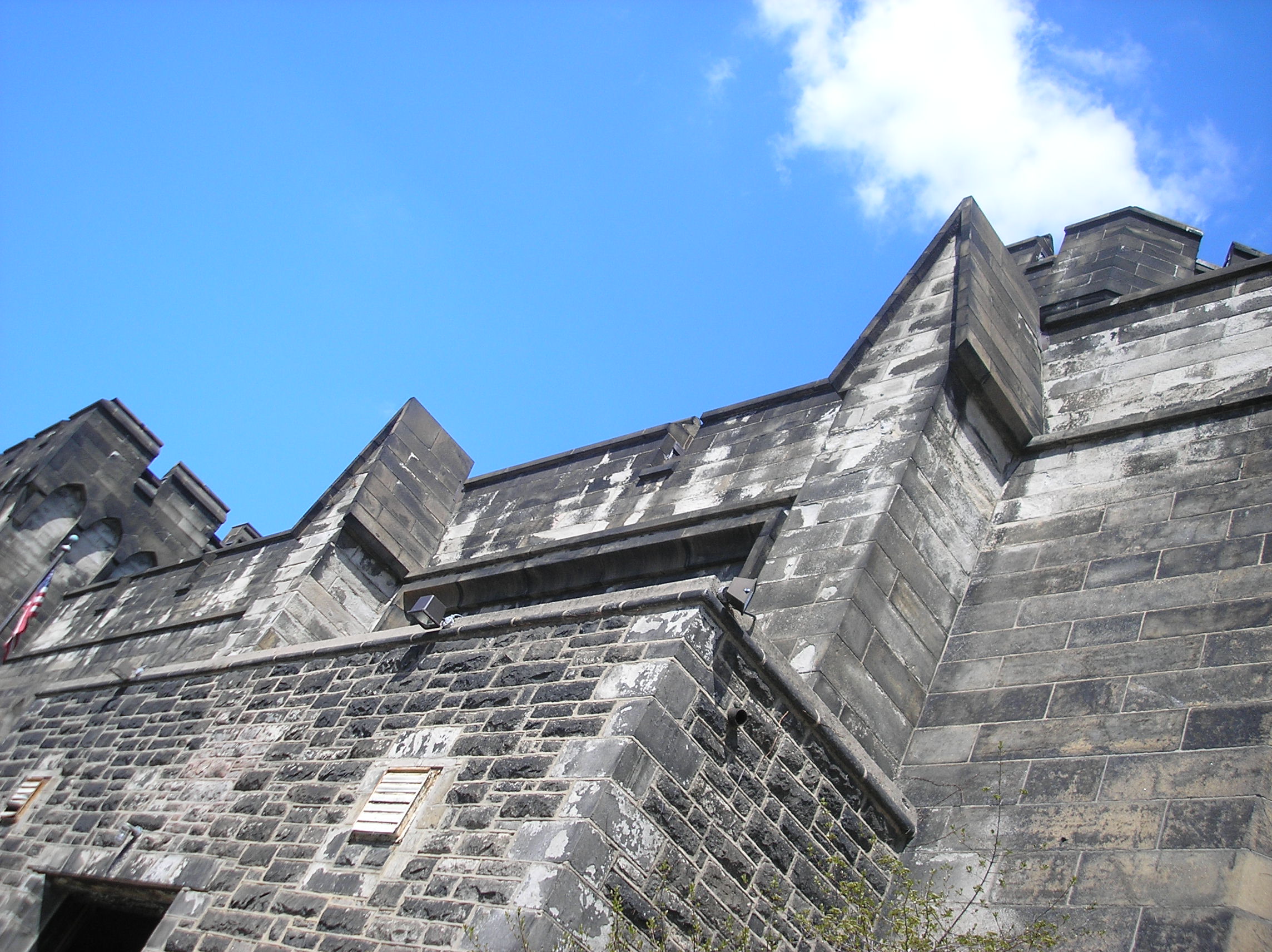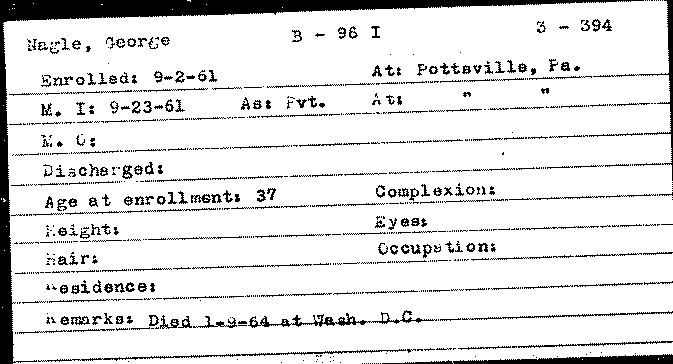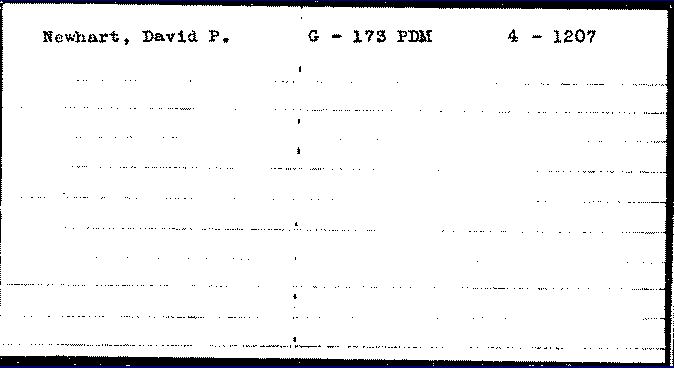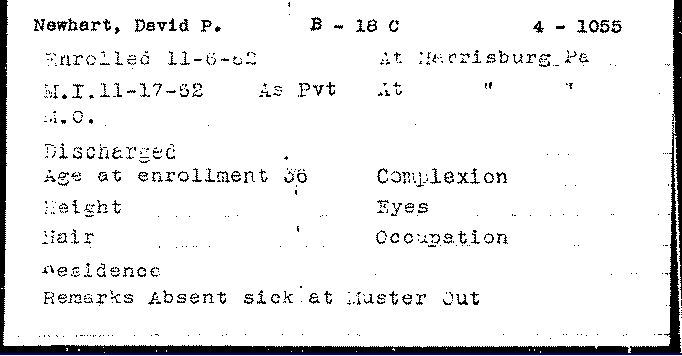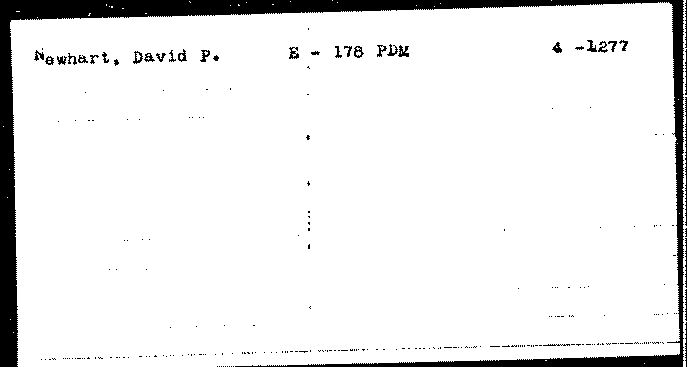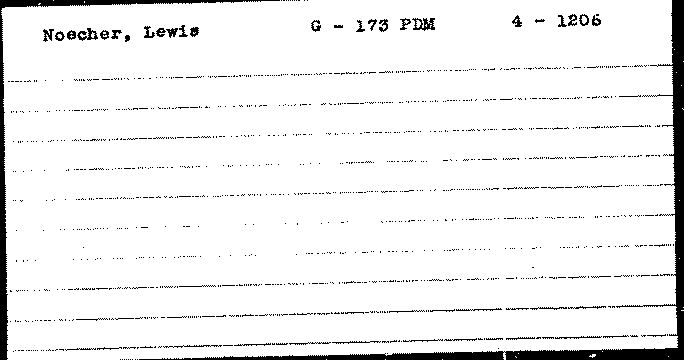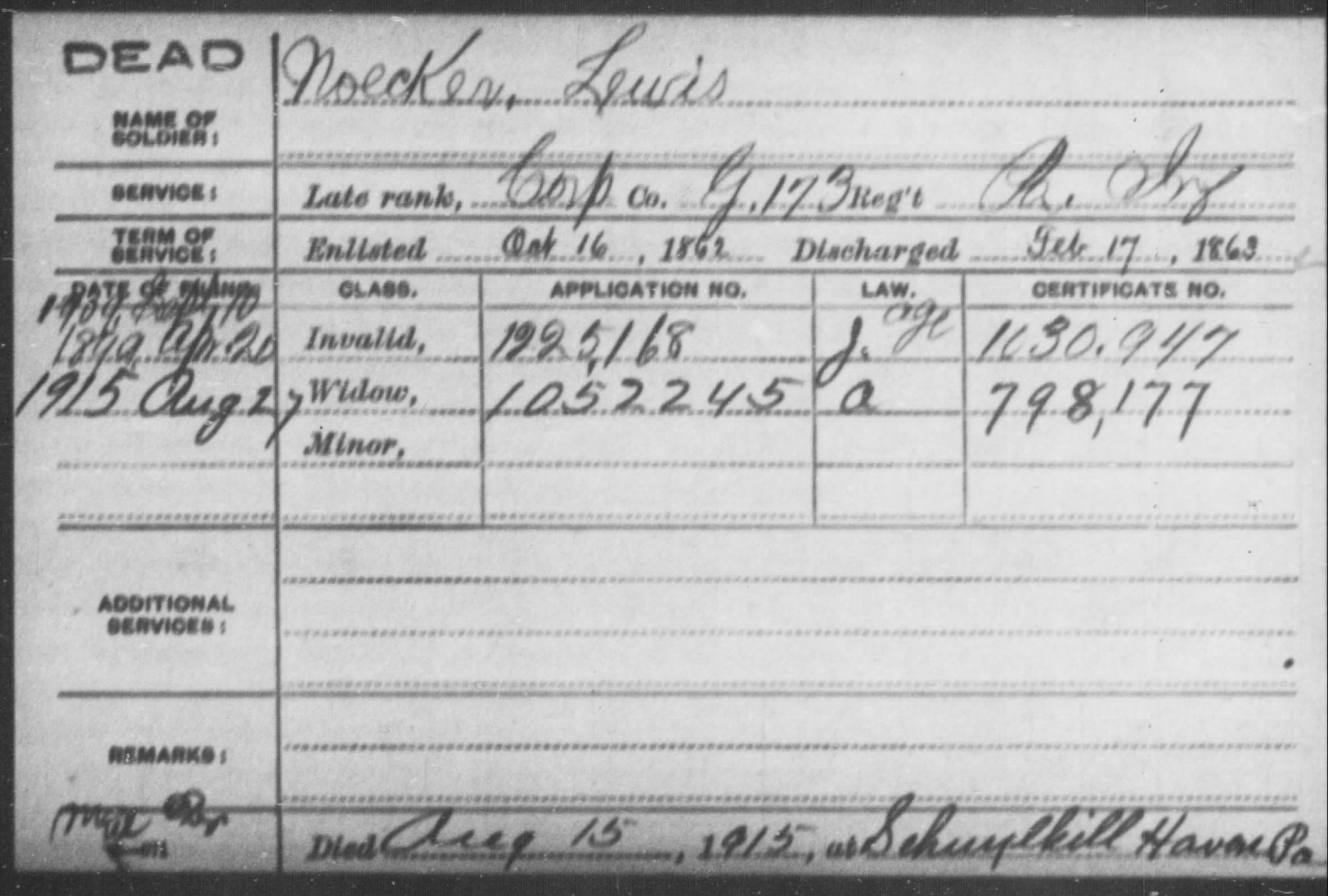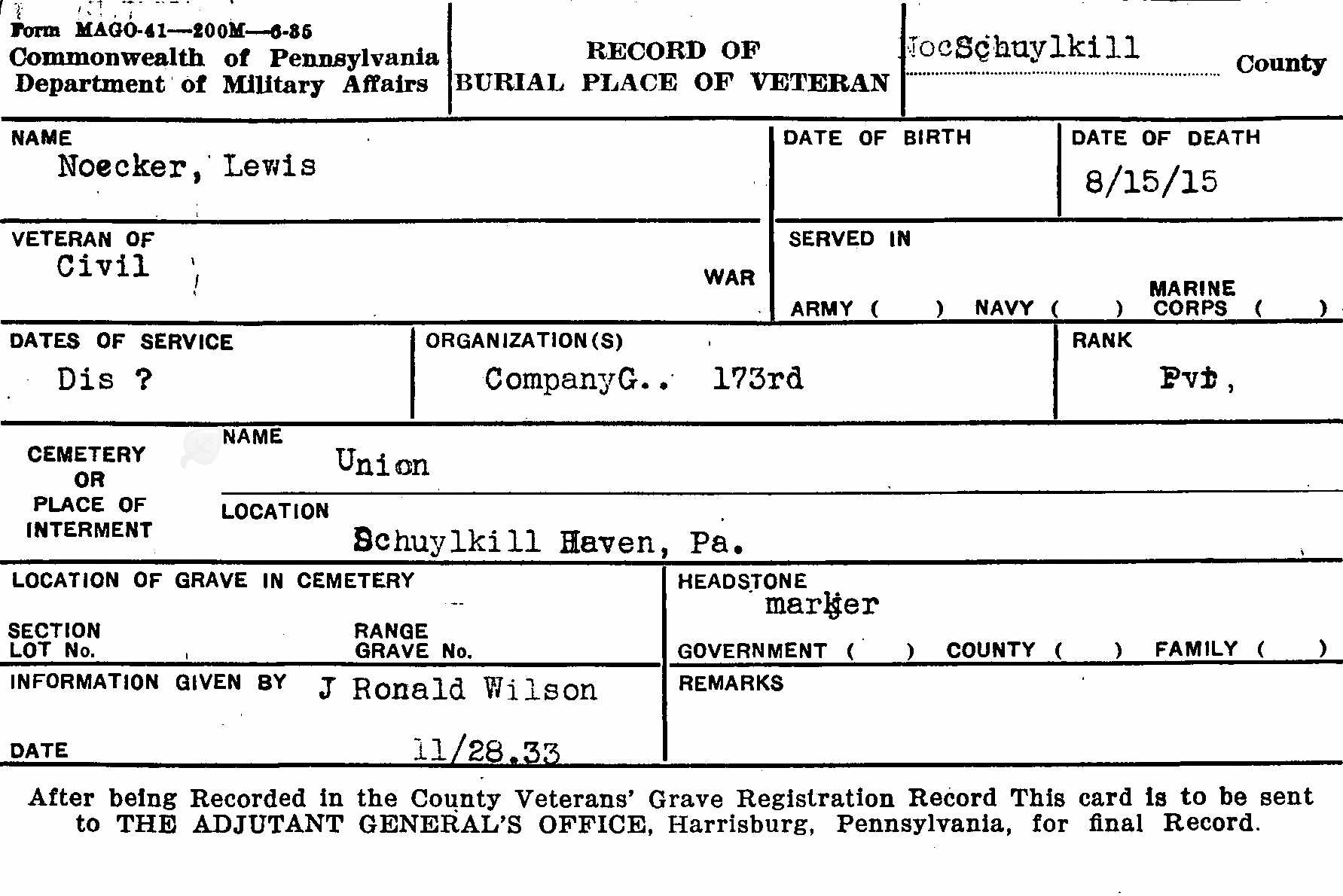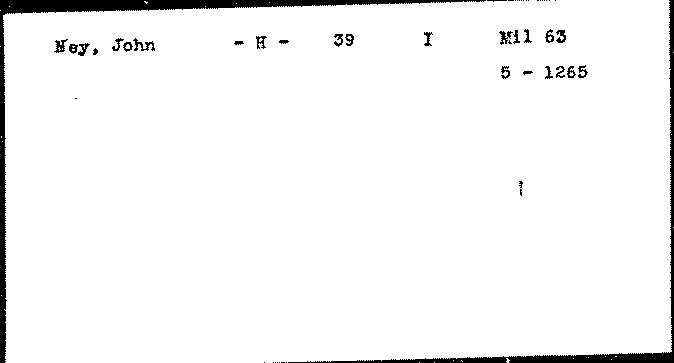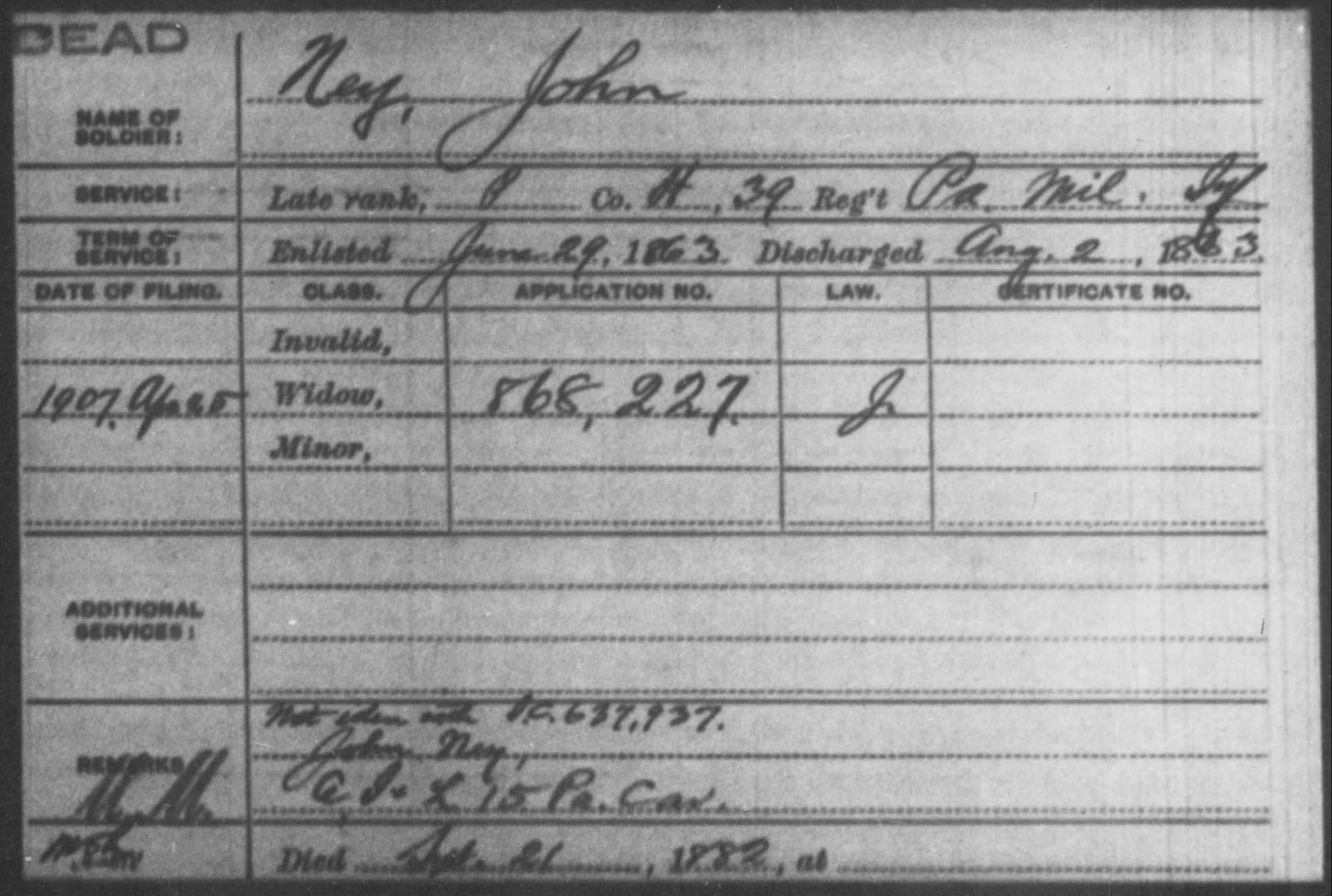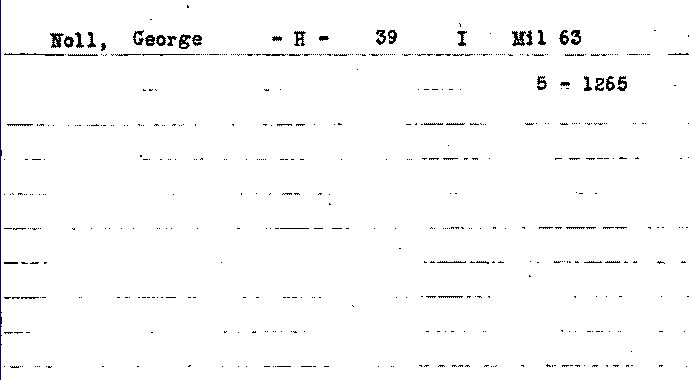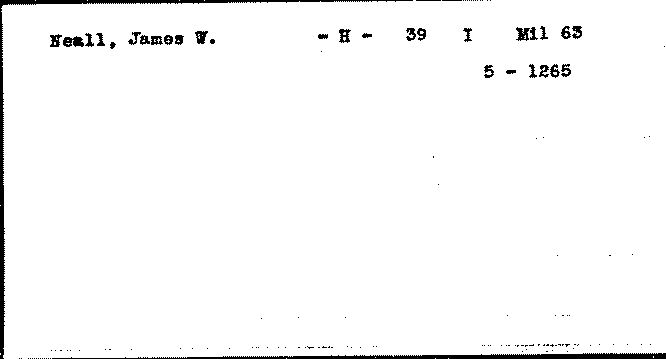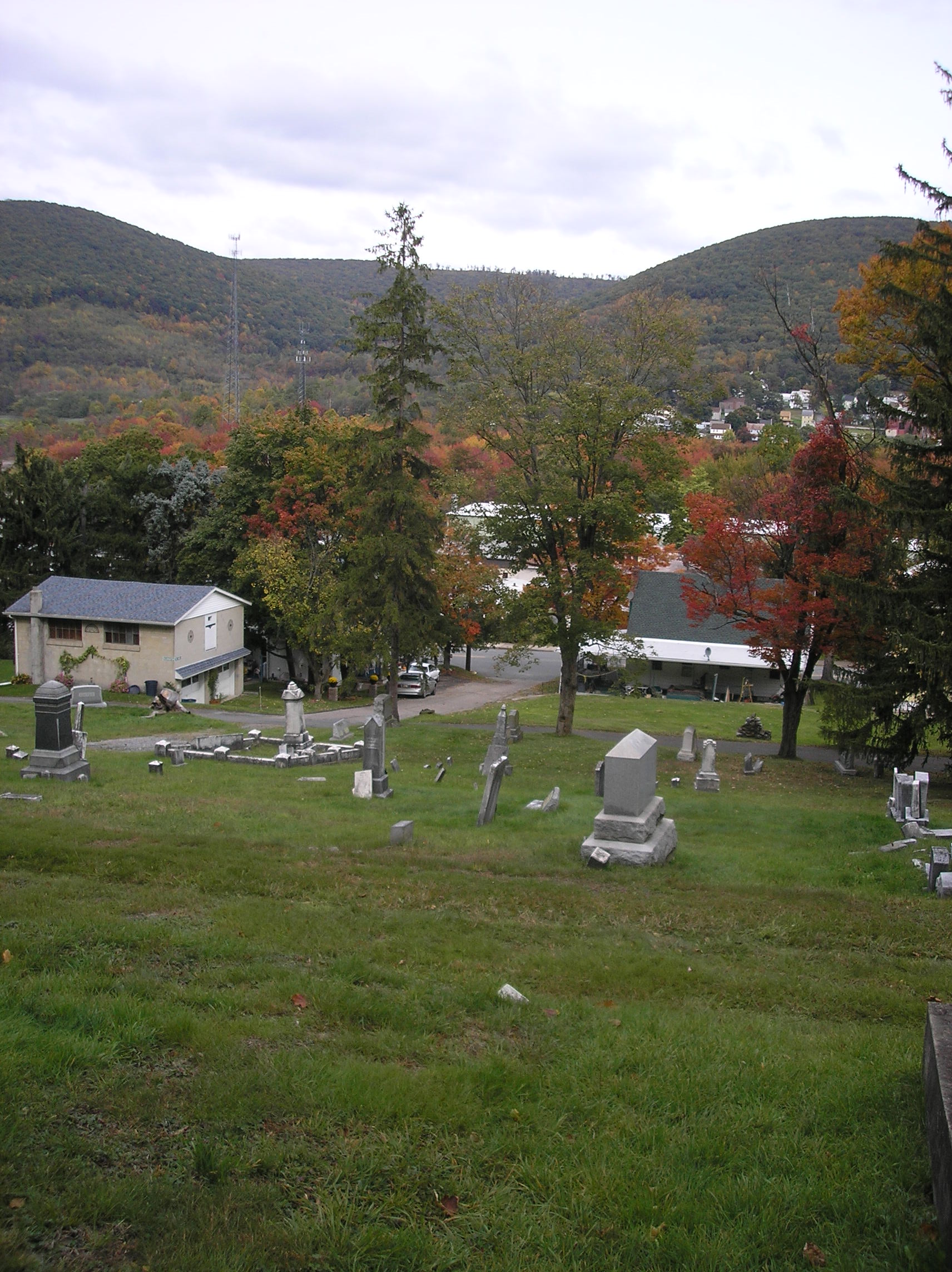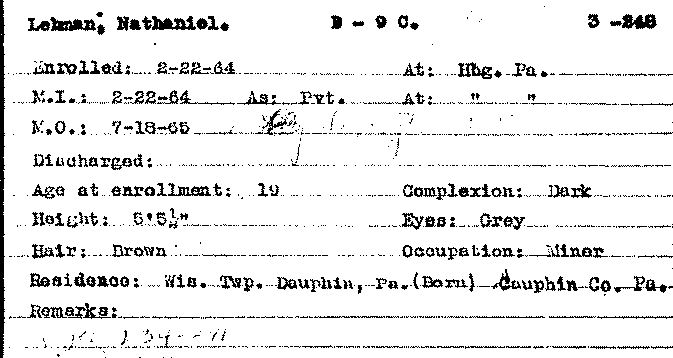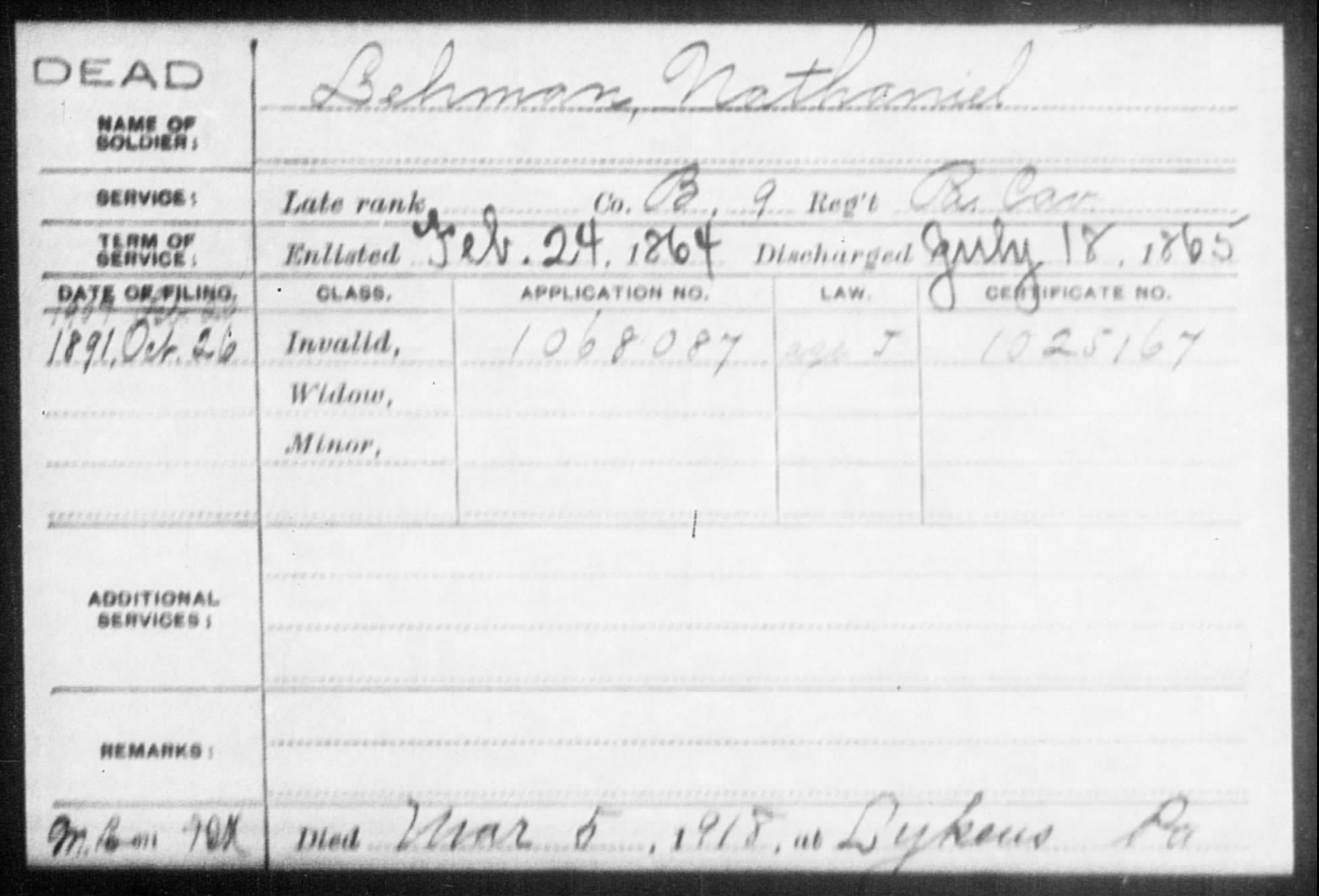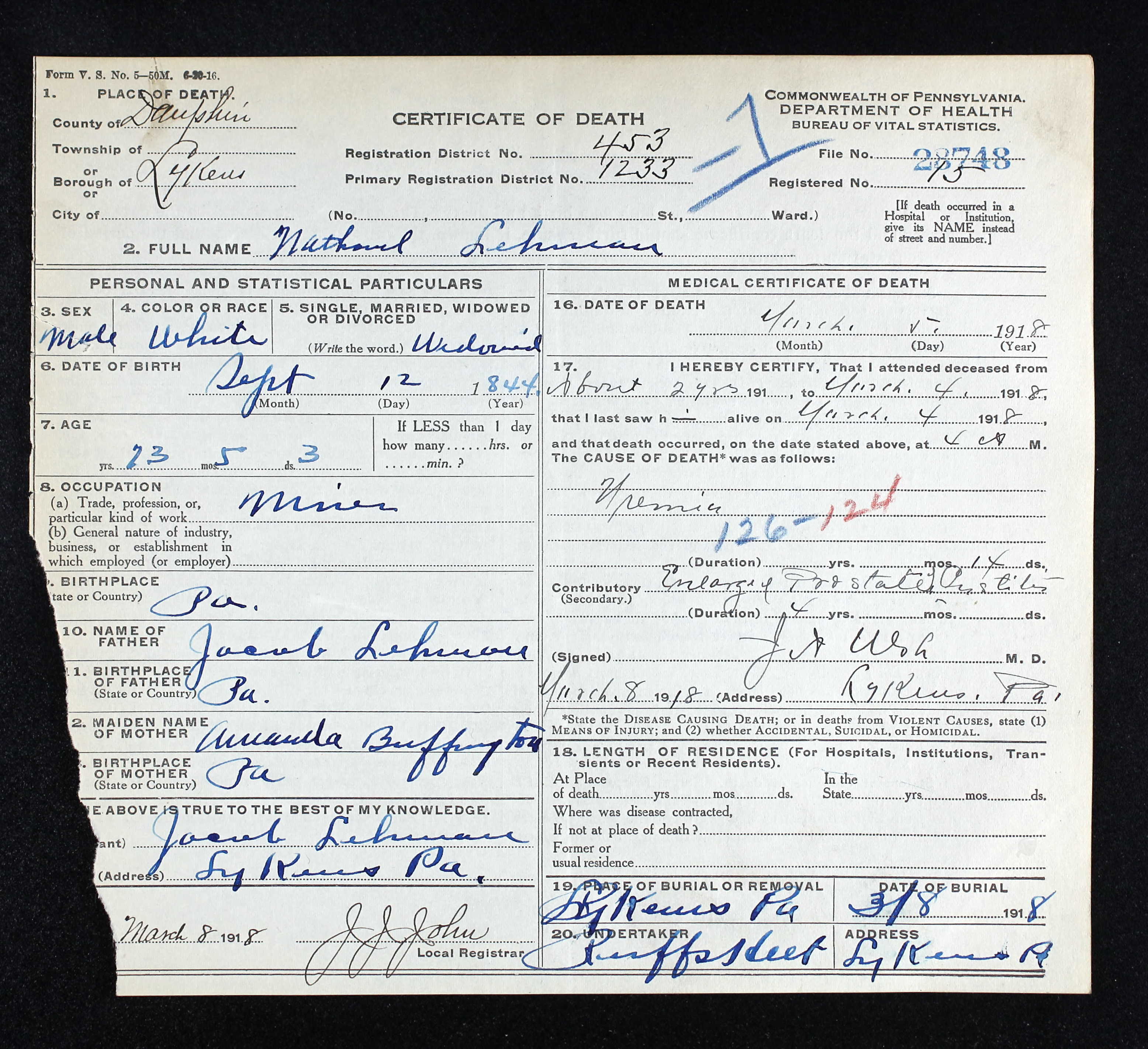Posted By Norman Gasbarro on October 12, 2016
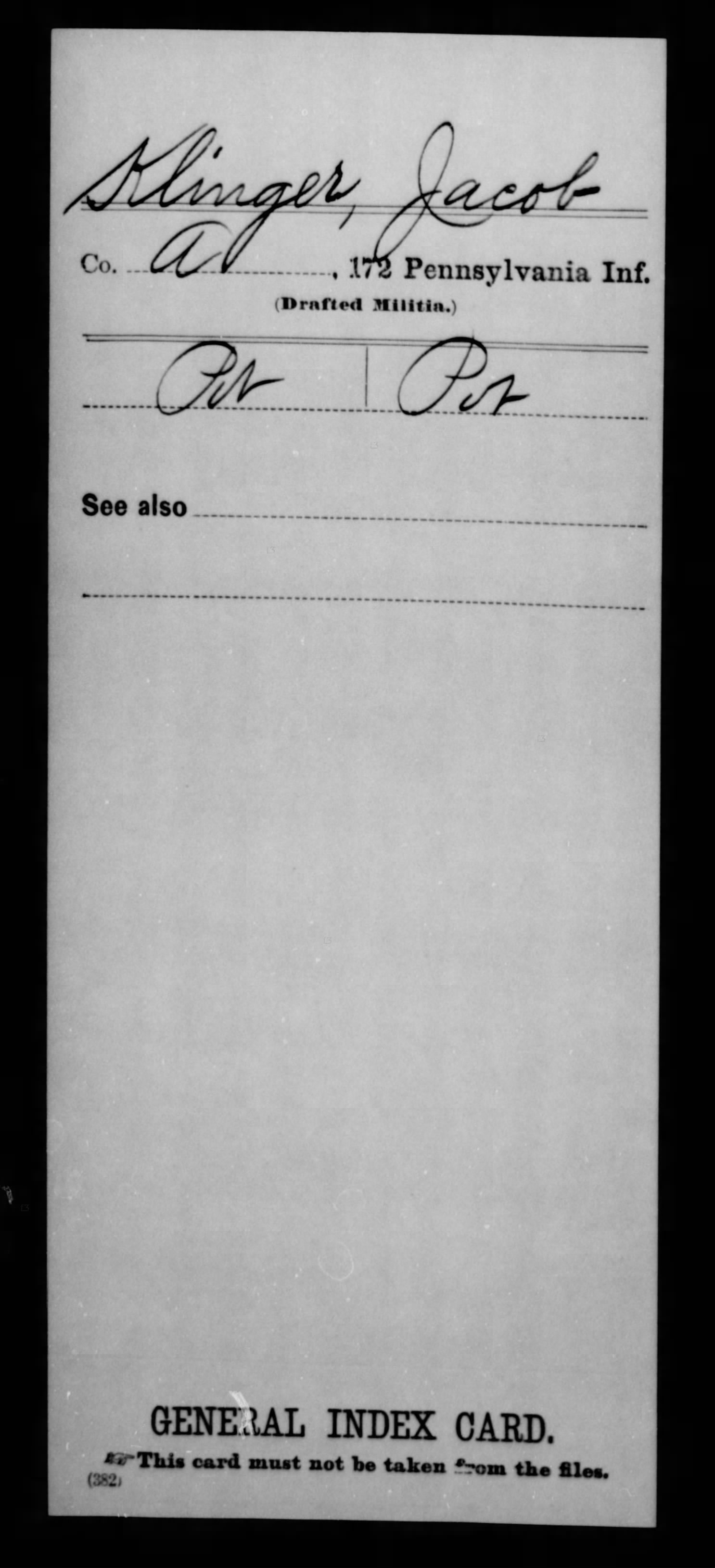
Part 5 of this murder story will be told in today’s blog post. It includes the appeal of the second trial and the third trial and conviction of Henry Fisher, this time for second degree murder.
Sarah Ann [Reed] Klinger, a widow of a Civil War veteran and a pensioner, was brutally murdered in her home near Shamokin, Northumberland County, Pennsylvania, on 21 November 1906. Through the stories printed in newspapers of the time, this horrendous murder story will be told. In Part 1, the initial reports of the murder were presented as well as speculation on the motive and the arrest of Henry Fisher. In Part 2, the initial courtroom appearance in February 1907 was followed by Fisher’s incarceration at the Danville Asylum so he could be evaluated for insanity. In Part 3, the trial and conviction of Henry Fisher was told, with his sentencing to death by the Court. In Part 4, the second trial and conviction of Henry Fisher was told, with the indication that his attorneys would again appeal the conviction, this time based on the intoxication of the jurors.
Jacob Klinger was born on 3 April 1843 in Lower Mahantongo Township, Schuylkill County, Pennsylvania. During the Civil War, he served in the 172nd Pennsylvania Infantry, Company D, as a Private, from 27 October 1862 through 1 August 1863. Jacob Klinger died in early 1899. He had been collecting a pension, which, after his death, Sarah applied for and was receiving at the time of her murder. Klinger’s Military Index Card (from Fold3) is shown at the top of this post.
From the Pittston Gazette (Pennsylvania), 20 October 1908; and also from the Philadelphia Inquirer, 20 October 1908:
Sunbury, Pennsylvania, 20 October — ….
The court… received an application for a new trial in the case of Henry Fisher, convicted of murdering Mrs. Sarah Klinger, in Shamokin. His counsel alleges that some of his jurors drank in saloons, and left the court room while evidence was being presented.
From the Mount Carmel Item (Pennsylvania), 20 October 1908:
THE REASONS FOR NEW TRIAL
Attorneys Welsh, Welsh and Morganroth yesterday appeared before court and filed their reasons for a new trial for Henry Fisher, twice convicted of murder in the first degree after he had brutally slain Mrs. Sarah Klinger. The attorneys aver that the jury which convicted Fisher had separated several times during the trial. Members of the jury were seen drinking in saloons and some of them even left the courtroom while evidence was being taken. Judge Savidge will go over the reasons carefully and if he considers them of sufficient weight Fisher will get another chance to save his life.
From the Daily News (Mount Carmel, Pennsylvania), 12 January 1909:
THE FISHER JURY MEN WERE DRUNK?
The Murderer’s Counsel Claims So – Demands a New Trial for the Brute
Alleging that the jurors drank intoxicating liquor during the trial, counsel for Henry Fisher, convicted of the murder of Mrs. Sarah Klinger at Shamokin, are endeavoring to get another chance to make a fight for the life of their client. They hold that the jurymen were unable to appreciate the value of the testimony introduced.
During the argument for a new trial some of the jurymen were heard. William Dehaven acknowledged being in a saloon, but said that he did not drink anything of an intoxicating nature. Samuel Sowers, another juror, said he took one drink, while a court official was present with him in a restaurant. Dr. P. H. Jones was asked if Dehaven had not told him prior to the trial that Fisher was a scoundrel and should be hanged. The physician answered that the juror said Fisher should be executed if guilty.
During the trial Fisher feigned insanity, and while in prison tore out his eyebrows and eyelashes.
From the Philadelphia Inquirer, 19 January 1909:
CALLS JURY PERJURERS
Thrice -Convicted Murderer May Get New Lease of Life
Special to The Inquirer.
SELINS GROVE, Pennsylvania, 18 January — That the argument today on the reasons in the Henry Fisher murder murder case may result in another lease of life for Fisher is believed on all sides. This was the most sensational murder trial in the criminal annals of Northumberland County, the defendant having been convicted and sentenced to death three [sic] times.
The defendant’s attorneys contend that it was shown that the jury during the trial had been in communication with outsiders. John Welsh, attorney for the Commonwealth [sic], said to the court that the jury in this case had been deliberating while intoxicated, and that the testimony showed that some of the jurors were perjurers, and that a man’s life should not be thus put in jeopardy.
From the Mount Carmel Item (Pennsylvania), 19 January 1909:
MURDERER FISHER BEFORE THE COURT
ATTORNEYS WAX ELOQUENT — BRAND JUROR AS LIAR — ASSAIL THE NEWSPAPERS
Henry Fisher, brutal murderer of Mrs. Sarah Klinger, who has already had two trials for his life, and who seeks a third, was up before the court yesterday morning when argument was made in his behalf by Attorneys Welsh, Welsh and Morganroth. Stirring speeches, delivered with characteristic power by the murderer’s counsel, added interest to the proceedings.
Attorney John Welsh sailed into one of the jurors, branding him as a perjurer. He then assailed the county newspapers, condemning them for the stand they have taken in Fisher’s case.
The usual pleas were advanced for the brutal murderer and Judge Savidge will give his decision later.
From the Philadelphia Inquirer, 5 May 1909:
Claims He Did Not Kill Woman
Special to the Inquirer.
SUNBURY, Pennsylvania, 4 May — Judge Savidge today summoned Henry Fisher, convicted murderer of Mrs. Sarah Klinger, of Shamokin, before him, and announced that he had decided to refuse a new trial. Following this the judge asked Fisher if he had anything to say why he should not be sentenced to be hanged. The prisoner replied: “I did not kill Mrs. Klinger.” His counsel will apply for a new trial, claiming members of the jury had been separated during the trial.
From The Columbian (Bloomsburg, Pennsylvania), 6 May 1909:
Fisher Will Hang for Killing Mrs. Klinger
Henry Fisher, convicted of killing Mrs. Sarah Klinger, was sentenced to be hanged by Judge Savidge on Monday at Sunbury.
Fisher as well as the woman killed was a resident of Shamokin. The murder, which took place over a year ago, was an especially cold-blooded and brutal one. Fisher, after being convicted, was adjudged insane and brought to the hospital at Danville. Many thought that he was feigning insanity; at all events after being incarcerated for a short time he was removed to the jail at Sunbury.
Fisher’s case was taken to the Supreme Court, but the lower court was sustained. Accordingly, sentence was passed upon him.
Fisher was commanded by Judge Savidge to arise and he complied in a stoical, unemotional manner, The court asked him if he had anything to say why sentence should not be passed upon him. He replied that he had nothing to say beyond the fact that he was “not guilty.”
Judge Savidge informed him that he had received a fair trial and that a jury of twelve men had adjudged him guilty of murder in the first degree.
Then in due and legal form Judge Savidge pronounced the sentence of death. The silence was intense and the words of the judge could be heard in every part of the court room as he informed Fisher that he was to be “hanged by the neck until he was dead.”
It only remains now for the Governor to fix the day for the execution.
From the Wilkes-Barre Times Leader (Pennsylvania), 8 July 1909:
MURDERER ATTACKS WARDEN
Pretense of Insanity Gets Him Into Dungeon
SUNBURY, Pennsylvania, 8 July — Feigning insanity, Henry Fisher, convicted of murdering Mrs. Sarah Klinger, in Shamokin, broke furniture in his cell, and when a warden remonstrated Fisher deeply cut him on the head with a salt-shaker. The murderer was placed in a dungeon.
From the Daily News (Mount Carmel, Pennsylvania), 9 July 1909:
Murderer Attacks Warden
Feigning insanity, Henry Fisher, convicted of murdering Mrs. Sarah Klinger in Shamokin, broke furniture in his cell at Sunbury. When a warden remonstrated Fisher deeply cut him on the head with a salt shaker. The murderer was placed in a dungeon.
From the Mount Carmel Item (Pennsylvania), 9 July 1909:
FISHER IS AGAIN PLACED IN DUNGEON
Becoming restless and impatient over the long confinement and the slowness with which the law moves in trying his case, Henry Fisher, who so cruelly murdered Mrs. Sarah Klinger and who was twice tried and found guilty of the murder and sentenced to hang, has renewed his former mean habits, which aroused the ire of the jail authorities, and as a result is again confined to the dungeon in the jail at Sunbury.
During his first trial Fisher through his maniacal actions succeed in fooling the court authorities to such an extent that his trial was called off and the fellow sent to the Danville Insane Asylum for treatment, where it was discovered that the man was shamming and he was returned here to be tried.
During his stay at Danville, Fisher confessed to an attendant.
Since then, his case has gone before two juries, both of which found him guilty of murder in the first degree.
During his incarceration Fisher at times would become unruly and abusive, acting more like a wild beast than a human being, with the hopes of shamming insanity. It did not work a second time however and each time he was placed in the dungeon, the only means by which the murderer was brought to his senses.
Lately Fisher has been on good behavior but last week he again showed manifestations of his old ugliness. After smashing the furniture in his cell and doing countless other damage, the jail warden attempted to stop him. This so incensed the murderer that he picked up a salt shaker and hurled it at his keeper, striking him in the eye and badly bruising it. For this act Fisher was again placed in the dungeon and will not be let out until he has tamed down again.
From the Mount Carmel Item (Pennsylvania), 25 September 1909:
THE FISHER CASE
The Henry Fisher murder case will be again argued before the Supreme Court. Probably no murder case in the history of Northumberland County has attracted the widespread attention that the Fisher case has and the outcome of the coming argument before the highest tribunal in the state will be eagerly looked for. Fisher was first tried for the murder of Mrs. Sarah Klinger in September 1907. An appeal was made by his attorneys and the higher court in May 1908, reversed the judgment of the lower court and ordered a new trial. The second trial took place in September 1908, when the verdict was once more against the defendant. His lawyers took exception to the verdict in the last trial and base their reasons for a new trial on twelve assignments of error, including introduction of improper evidence and the separate and gross misconduct of the jury during the trial. Service was made yesterday on the district attorney of the appellant’s paper book, Commonwealth vs. Fisher. The arguments will be presented to the Supreme Court during the week of Monday, October 4th.
From the Wellsboro Gazette (Pennsylvania), 29 September 1909:
Northumberland County has a way of permitting prolonged trials for murder. Two years ago, in September, 1907, the case of Henry Fisher was begun, for the alleged murder of Mrs. Sarah Klinger. Next month the Supreme Court is to hear this notable case, and the paper book to be argued contains 800 pages. “The only interest the public has in this latter item,” says The Milton Standard, “is the probability that in the end it will be obliged to pay for it.”
From The Columbian (Bloomsburg, Pennsylvania), 30 September 1909:
THE FISHER CASE
Will Be Argued Before Supreme Court Next Week
The Henry Fisher murder case will be again argued before the Supreme Court. Probably no murder case in the history of Northumberland County has attracted the widespread attention that the Fisher case has and the outcome of the coming argument before the highest tribunal in the state will be eagerly looked for. Fisher was first tried for the murder of Mrs. Sarah Klinger in September, 1907. An appeal was made by his attorneys and the higher court in May, 1908, reversed the judgment of the lower court and ordered a new trial. The second trial took place in September, 1908, when the verdict was once more against the defendant. His lawyers took exception to the verdict in the last trial and base their reasons for a new trial on twelve assignments of error, including improper evidence and the separate and gross misconduct of the jury during the trial. The arguments will be presented to the Supreme Court during the week of Monday, October 4th.
From the Pittsburgh Post Gazette (Pennsylvania), 12 October 1909:
MURDER JURORS LOOSELY GUARDED
Allegations Made in Supreme Court That They Were Allowed Liberty and Whiskey…
In the argument for a new trial for Henry Fisher, convicted of murder in the first degree in Northumberland County, heard by the Supreme Court yesterday, accusations were made that the jury in his case was guarded with remarkable laxity.
Fisher was charged with the murder of Sarah Klinger, 65 years of age, who lived in the same house as he did in West Shamokin. After his arrest, both orally and in writing, he accused his wife of the crime. When first brought to trial he acted with such violence that the trial was postponed and he was sent to an asylum. His counsel claim he was insane, while the state says he was shamming.
In the argument for Fisher the fact that he was not tried at the first term of court after being indicted, objections to the manner of securing a jury and to some of the evidence admitted were used. The unusual feature of the case related to the handling of the jurors during the trial. It was asserted that they were not kept together, that the public could have had access to them and that whiskey and beer were supplied to them. In one instance one of the tipstaves drank with a juror. It was asserted that once several jurors left the court room and passed into a crowded hallway, and that the presiding judge followed and tried to find a tipstaff to take care of them. The judge when examined on this point had some faint recollection of something of that kind. All this, Fisher’s counsel asserted, prevented him from having a fair trial. The attorneys for the state did not deny that there had been a separation of the jury and admitted that the tipstaves had not been as careful as they might have been. They denied, however, that any communication prejudiced to Fisher had passed. The drinking of the jurors was admitted, with the assertion that they did not drink to excess.
From the Pittsburgh Daily Post, 12 October 1909
JURY IN MURDER CASE ENJOYS REAL PICNIC
Supreme Court Hears That Members and Tipstaff Had Beer and Whisky…
That the jury in a murder case had the freedom of courtroom corridors and mingled with the crowds, and that a tipstaff joined them in drinking liquor, was the remarkable claim made yesterday before the Supreme Court in the argument in behalf of Henry Fisher, convicted of murder in the first degree in Northumberland County.
Fisher was charged with the murder of Sarah Klinger, 65 years old, who lived in the same house with him, in West Shamokin. Following the crime Fisher spent some time in an asylum, but the prosecution declared he was feigning insanity. He blamed his wife for the crime.
The charge that beer and whisky were openly supplied to the jurors was made and it was claimed that several jurors at one time left the courtroom and mingled with the crowds. Fisher’s counsel say he did not have a fair trial. The drinking of the jurors was admitted, with the excuse that they did not drink to excess.
From the Daily News (Mount Carmel, Pennsylvania), 15 October 1909
SENATORS IN THE FISHER CASE
HOW THE STORY OF A JUROR DRINKING A GLASS OF BEER IS EXAGGERATED
The following dispatch comes from Pittsburgh where the attorneys for Fisher are trying to get him another trial. In Northumberland County it is a joke.
Pittsburgh, 13 October — That the jury in a murder case had the freedom of court room corridors and mingled with the crowds and that a tipstaff joined them in drinking liquor, was the remarkable claim made yesterday by Attorneys Welsh and Morganroth before the Supreme Court in the argument in behalf of Henry Fisher, convicted of murder in the first degree in Northumberland County. Fisher was charged with the murder of Sarah Klinger, sixty-five years old, who lived in the same house with him in West Shamokin. Following the crime Fisher spent some time in an asylum, but the prosecution declared that he was feigning insanity. He blamed his wife for the crime. The charge that beer and whiskey were openly supplied to the jurors was made and it was claimed that several jurors at one time left the court room and mingled with the crowds. Fisher’s counsel says he did not have a fair trial. The drinking of the jurors was admitted, with the excuse that they did not drink to excess.
From the Mount Carmel Item (Pennsylvania), 15 December 1909:
FISHER WILL SOON KNOW FATE
Henry Fisher, twice convicted of the murder of Sarah Klinger in Shamokin, whose attorneys, Welsh and Welsh recently applied to the supreme court of the state for a new trial, will in a few weeks know his fate. The judges of the highest court in the commonwealth whose rose in Pittsburgh on Friday, November 12th, will again sit in Philadelphia on the first Monday in January, 1910, when it is expected that a decision on the appeal will be handed down.
The case of Fisher is one of the longest drawn out that has ever been tried in Northumberland County. The murder for which he was twice convicted was committed in 1906. Since that time, Attorneys Welsh and Welsh have been fighting with bulldog tenacity to save the condemned man from the gallows and thus far have met with great success. This is the second time that the lawyers have taken an appeal to the supreme court and should they prove successful in securing a new trial, the case will hold the boards of the county for another year.
From the Mount Carmel Item (Pennsylvania), 4 January 1910:
A NEW TRIAL FOR HENRY FISHER
Henry Fisher, twice convicted of the murder of Mrs. Sarah Klinger, of Shamokin, was yesterday granted a new trial by the state Supreme Court.
The case has been drawn out longer than any other tried in Northumberland County. The murder for which he was twice convicted was committed in 1906. His first trial was scheduled for the December term, 1906, but was continued until February. Then it was continued until May, at the request of the defendant, who said that his attorney had not had enough time to prepare the case. At the May term of Criminal Court the case was continued by the Commonwealth, the reason being that the prisoner’s physical condition would not allow him to undergo the ordeal of a trial.
On account of the prisoner’s poor health he was not tried until December, 1907, one year after the first trial was scheduled and he was convicted of the the murder. The attorneys for the convicted man immediately made a motion for a new trial, but the motion was overruled by the court.
An appeal was taken, and the case was argued before the Supreme Court in May, 1908. An opinion was handed down four weeks later, reversing the decision of the lower court, and a new trial was granted.
In September, 1908, Fisher was again tried, and as before, was found guilty of having committed the crime. Another motion for a new trial was made by the prisoner’s attorneys which was again overruled by the Northumberland County Court. The case was appealed his counsel contending that during the last trial the jury separated.
From the Wilkes-Barre Evening News (Pennsylvania), 4 January 1910:
SUPREME COURT GRANTS RETRIAL TO HENRY FISHER
Has Twice Been Convicted of Murder in the First Degree.
CRIME COMMITTED IN 1906
HANGING VERDICT SET ASIDE FOR SECOND TIME BECAUSE OF JURY SEPARATING
SHAMOKIN, Pennsylvania, 4 January — [Note: See above article from Mount Carmel Item, same date, same contents, but with a different header].
From The Columbian (Bloomsburg, Pennsylvania), 6 January 1910:
THIRD TRIAL FOR FISHER
Twice Convicted of First Degree Murder, Supreme Court Again Intervenes
The Supreme Court of Pennsylvania, siting in Philadelphia has granted the appeal of the counsel for Henry Fisher a new trial for their client, who was twice convicted at Sunbury of the murder of Mrs. Sarah Klinger, at Shamokin, over two years ago.
The decision of the court was based on the contention of the lawyers that the jurors in the case were separated at times during the trial and that they had communicated with other persons contrary to law, and that the prisoner was therefore entitled to a new trial.
The first time a new trial was granted the court based their decision on the fact that letters from Fisher to his wife, which were admitted as evidence, should have been excluded.
The crime of which Fisher is without doubt guilty, was the most atrocious that was ever committed in Northumberland County. He crushed the head of the aged woman with a stove raker.
From the Mount Carmel Item (Pennsylvania), 2 February 1910:
CRIMINAL COURT
The February session of criminal court will open in the court house at Sunbury next Monday, but with thirty-one cases listed for trial, and few old ones continued. One of the features of the court will be the fact that there are more cases from the upper end of the county than there are from the coal regions. There are about ten from Sunbury and Northumberland alone. Henry Fisher will be put on trial for the murder of Mrs. Sarah Klinger. The jury will be drawn at the opening of court.
From the Philadelphia Inquirer, 6 February 1910:
Newspaper Publishers Subpened [sic]
Special to the Inquirer.
SUNBURY, Pennsylvania, 5 February — Counsel for Henry Fisher, twice convicted of murder in the first degree for the killing of Mrs. Sarah Klinger, in Shamokin, today had subpenas [sic] served on all newspaper publishers in Northumberland County, claiming the press is published against Fisher. His counsel will ask for a change of venue.
From the Philadelphia Inquirer, 9 February 1910:
Fisher Again on Trial
Special to the Inquirer
SUNBURY, Pennsylvania, 8 February — For the third time Henry Fisher was again placed on trial today for the murder of Mrs. Sarah Klinger, in Shamokin, several years ago. He was convicted twice in the first degree, and his counsel appealed to the Supreme Court, which ordered new trials. Eight jurors were chosen by this evening when court adjourned.
From the Philadelphia Inquirer, 10 February 1910
Jury Hard to Get
Special to the Inquirer
SUNBURY, Pennsylvania, 9 February — A noon today a new panel of jurors, which Sheriff William Taby had sworn in since last night, having become exhausted in efforts to complete a jury to try Henry Fisher for murdering Mrs. Sarah Klinger in Shamokin. Judge Savidge announced that as two more jurors were necessary court would adjourn until tomorrow, when the Sheriff will have additional residents of the county to be examined as to their fitness for jurors.
From the Mount Carmel Item (Pennsylvania), 11 February 1910:
WHAT IT COST TO GET FISHER JURY
SHERIFF HAD 9 DEPUTIES DRIVING THROUGH COUNTY – WILL EXCEED $1000.00
Two special venires of forty men each were necessary in order to complete the jury to decide the fate of Henry Fisher, twice convicted murderer of Mrs. Sarah Klinger. The cost of securing these jurymen will exceed one thousand dollars.
Acting under instructions of the court, Sheriff Taby had deputies in readiness to go out into the body of the county for the necessary jurors. When the regular panel became exhausted the sheriff was ordered to secure forty men. A force of deputies was pressed into service and the talesmen were secured. However, another venire of forty was necessary and was secured Wednesday afternoon and evening.
As there were eighty extra jurors summoned, each was allowed $2.50 per day and about $3 mileage, making a total of $440 for special jurors alone. Then, too, the sheriff had a force of nine deputies at work and as it was necessary for each deputy to have a horse and carriage in order to make his rounds through the country districts, the total cost of securing the two special venires will be a thousand dollars or more.
Trial Continues
The Fisher trial continues yesterday afternoon and this morning and at the present rate of taking evidence it appears as if the trial will run through Monday and Tuesday of next week. The same evidence is being offered as in the previous trials with a slightly new phase added by the cross-examination of the Commonwealth’s witnesses by the lawyers for the defense. Fisher having been already twice convicted through their previous attempts to befog the jury the attorneys are trying to case the crime upon a dead shoemaker who was dying in the house adjoining the Klinger home when the old woman was murdered.
From the Mount Carmel Item (Pennsylvania), 12 February 1910:
MURDER TRIAL MOVES SLOWLY
WITNESSES’ RECOLLECTIONS CONFUSED OWING TO LONG LAPSE OF TIME
The trial of Henry Fisher proceeds slowly. The Commonwealth will has an abundance of testimony to offer and the defense is still to be hearts. The case in all probability will go over Sunday and will continue next week. Every convenience will be given to the jurors during the time that they will be shut off from the rest of the world. At the same time the guard over them will be strict, and no chances will be taken for the securing of a fourth trial on this ground.
Only a few witnesses were heard yesterday. Their testimony was fought every inch of the way by the counsel for the defendant. Their reliability was questioned frequently, and their recollection of events of the day of the murder still more so. It is now well over three years since that time and the recollection of many of the witnesses of small details is somewhat hazy.
A few witnesses kept notes of their part in the events of 21 November 1906, when Mrs. Sarah Klinger was killed, and they used them constantly in giving their testimony.
Others, who relied solely on their memories were frequently mixed by the counsel, who followed their previous testimony from the paper books of the other trials.
The evidence is circumstantial but convincing. A knife that belonged to Mrs. Klinger was offered for sale by the defendant on the day of the murder. Harvey Klinger, her son, told of finding the blood stained shirt of Henry Fisher’s hidden in an out-building.
William Delbaugh said that Fisher came into his bar room on the forenoon of the day of the crime and said that he had just done up some body and that the next time he would finish them properly.
He and his wife were in the house when the body was found.
Ex-Coroner Dreher testified that blows on the head from a stove raker which was offered in evidence were the cause of death.
From the Daily News (Mount Carmel, Pennsylvania), 12 February 1910:
Says Her Husband Lies
When Mrs. Ella Fisher, wife of the convicted slayer of Mrs. Sarah Klinger, was told at Tharptown, where she is employed as a housekeeper, that her husband had confessed that she had killed the woman and that he aided in the crime, she declared she had a perfect alibi to substantiate her statement that she was away from the Klinger house at the time the latter was killed.
From the Philadelphia Inquirer, 16 February 1910:
NO FISHER VERDICT
Jury in Murder Trial Still Out and May Not Agree
Special to the Inquirer.
SUNBURY, Pennsylvania, 15 February — The jury in the Henry Fisher murder trial was unable to reach a verdict up to a late hour tonight, having been debating since 11:20 o’clock this morning.
Fisher was convicted twice before of murdering Mrs. Sarah Klinger in Shamokin three years ago, but his counsel appealed to the Supreme Court, presenting a number of reasons sufficient for that court to order new trials.
It is the impression of a number of people that the jury will disagree. Fisher believed that the jury remaining out so long indicates that he will be acquitted.
From the Reading Times (Pennsylvania), 17 February 1910; also from the Harrisburg Patriot, 17 February 1910:
ESCAPES FIRST DEGREE VERDICT
Thrice Convicted of Murder, Slayer of Sarah Klinger, Gets Off With 20 Year Sentence
[By Associated Press.]
Sunbury, Pennsylvania, 16 February — Henry Fisher, charged with the murder of aged Mrs. Sarah Klinger, of Shamokin, was tonight found guilty of murder in the second degree and sentenced to 20 years in the Eastern Penitentiary.
This was the third trial of Fisher. The two previous trials resulted in first degree verdicts, but owing to irregularities in the trial an appeal was taken and new trials ordered.
From the Philadelphia Inquirer, 17 February 1910:
FISHER AGAIN FOUND GUILTY
Murderer of Mrs. Klinger Gets Second Degree Verdict and is Sentenced
Special to the Inquirer.
SUNBURY, Pennsylvania, 16 February — Convicted twice in the first degree for the murder of Mrs. Sarah Klinger in Shamokin three years ago, a jury in the third trial returned a verdict of guilty in the second degree against Henry Fisher tonight, after deliberating since 11:40 o’clock yesterday morning. As the jury entered the court room Fisher was directed to face it, and when they declared their finding he shook with joy. Judge Savidge then sentenced Fisher to twenty years in the Eastern Penitentiary. Fisher grew pale as he heard the sudden announcement and almost collapsed. When he recovered the full strength of his limbs he was escorted by the sheriff and deputies back to jail, where he said he was glad he was not to go to the scaffold.
Fisher was convicted twice before of the murder in the first degree, but his counsel appealed to the Supreme Court for new trials, which were granted. Fisher will be taken to the penitentiary as soon as possible.
From the Pittsburgh Daily Post (Pennsylvania), 17 February 1910:
Three Times Convicted of Murder
SUNBURY, Pennsylvania, 16 February — Henry Fisher, charged with the murder of Mrs. Sarah Klinger, of Shamokin, was tonight found guilty of murder in the second degree and sentenced to 20 years in the Eastern Penitentiary. This was the third trial of Fisher. The two previous trials resulted in first degree verdicts but were set aside on appeals.
From the Gettysburg Times (Pennsylvania), 18 February 1910; also from the Daily News (Mount Carmel, Pennsylvania), 18 February 1910; also from the Mount Carmel Item (Pennsylvania), 18 February 1910; also from the Allentown Leader (Pennsylvania), 18 February 1910; also from the Adams County News (Pennsylvania), 19 February 1910.
SLAYER SAYS WIFE KILLED WOMAN
Henry Fisher, Convicted of Murder, Makes Confession
Sunbury, Pennsylvania, 18 February — Henry Fisher, found guilty in the second degree of murdering Mrs. Sarah Klinger, in Shamokin, over three years ago, and who was tried three times at an expense of almost $10,000 to the county, made the following confession to Sheriff William Taby:
“I was at a saloon on the morning of the killing and then started for Mrs. Klinger’s home. I reached there and found my wife and Mrs. Klinger had been quarreling. They had been doing so from the time I went out in the morning and were at it yet when I came back, I went in another room and heard nothing until about ten minutes later, when I heard my wife well out, ‘I’ll knock your head off.’
“With that I ran out and saw my wife pick up a stove poker and hit Sarah on the back of the neck.
“The blow knocked her down and she fell against the door jam and got several more wounds. In falling against the door she lost her balance against and went down headforemost striking her nose against the edge of a box in which were some playthings breaking her nose.
“My wife dragged the body over to the foot of the stairs and said, ‘I guess they’ll think she tumbled down.’ There Mrs. Klinger lay and the next thing I knew they collared me and I got the blame.”
From the Philadelphia Inquirer, 18 February 1910:
FISHER SAYS WIFE KILLED MRS. KLINGER
Shamokin Man, Thrice Convicted of Murder, Signs Confession in Presence of Sheriff
Special to the Inquirer.
SHAMOKIN, Pennsylvania, 17 February, three times convicted of murdering Mrs. Sarah Klinger, in Shamokin, over three years ago, two juries finding a verdict of guilty in the first degree, and twelve men last night on the fifty-ninth ballot returning a second degree verdict, for which Fisher will serve twenty years in the Eastern Penitentiary, made a confession today to Sheriff Taby as follows:
“I was at a saloon on the morning of the killing and then started for Mrs. Klinger’s home. I reached there and found my wife and Mrs. Klinger had been quarreling. They had been doing so from the time I went out in the morning and were at it yet when I came back, I went in another room and heard nothing until about ten minutes later, when I heard my wife well out, ‘I’ll knock your head off.’
“With that I ran out and saw my wife pick up a stove poker and hit Sarah on the back of the neck.
“The blow knocked her down and she fell against the door jam and got several more wounds. In falling against the door she lost her balance against and went down headforemost striking her nose against the edge of a box in which were some playthings breaking her nose.
“My wife dragged the body over to the foot of the stairs and said, ‘I guess they’ll think she tumbled down.’ There Mrs. Klinger lay and the next thing I knew they collared me and I got the blame.”
Fisher’s three trials cost almost $10,000. The authorities have no evidence that Mrs. Fisher aided in the murder and as the law will not allow Fisher to testify against her she will not be prosecuted.
From the Mount Carmel Item (Pennsylvania), 19 Feb 1910:
HENRY FISHER MAY YET HANG
IT IS ALLEGED THAT HE MURDERED TWO YEAR OLD CHILD SEVERAL YEARS AGO
Henry Fisher, the convicted murderer of Mrs. Sarah Klinger but who escaped hanging because the jury brought in a second degree verdict, may yet stretch the hemp and go the way which every citizen of the county feels he should go if the story told by a relative is true, for Henry Fisher is a double murderer.
Miss Mary Mutchler, whose sister is married to the murderer, stoutly declares that several years ago Fisher murdered his own child. The woman states that in her presence Fisher picked up the child, which was aged about two year, and holding it above his head by the heels, stretched the little ones limbs as far apart as was possible dropped it on the floor, repeating the operation several times, only ceasing when compelled to do so by the mother’s screams. The child sustained concussions of the brain and died some days later. The physician in attendance stated at the time that the child’s death was caused directly by Fisher’s horrible deed but as the man was greatly feared, as it was alleged then that he had openly declared he had already killed several persons, no action was taken.
Miss Mutchler declared the story is absolutely correct and that she can be substantiated in it by the testimony of the physician and one more other persons who know of the circumstances.
As there is no legal limitation to the time in which a person can be tried for murder it is altogether probable that the district attorney will thoroughly investigate the story and if the evidence is sufficiently strong will have Fisher brought back to the county and tried for the crime.
From The Columbian (Bloomsburg, Pennsylvania), 24 February 1910:
FISHER MAY YET HANG
Murdered His Own Little son Several Years Ago
The following story comes from the regions. It should be fully investigated and if it is found on fact, Henry Fisher, who escaped the gallows last week by the grossest miscarriage of justice, should be brought back from the penitentiary and made to stand trial for this brutal and unnatural crime. Henry Fisher, the convicted murderer of Mrs. Sarah Klinger, but who escaped hanging because the jury brought in a second degree verdict may yet stretch hemp and go the way which every citizen of the county feels he should go if the story told by a relative is true, for Henry Fisher is a double murderer. Miss Mary Mutchler, whose sister is married to the murderer, stoutly declares that several years ago Fisher murdered his own child. The woman states that in her presence Fisher picked up the child, which was aged about two years, and holding it above his hear by the heels, stretched the little one’s limbs as far apart as possible, dropped it on the floor, repeating the operation several times, only ceasing when compelled to do so by the mother’s screams. The child sustained concussion of the brain and died. The physician in attendance stated at the time that the child’s death was caused directly by Fisher’s horrible deed but as the man was greatly feared, as it was alleged then that he had openly declared he had already killed several persons, no action was taken. Miss Mutchler declares the story is absolutely correct and that she can be substantiated in it by the testimony of the physician and one or more other persons who know of the circumstances. As there is no legal limitation to the time in which a person can be tried for murder it is altogether probable that the district attorney will thoroughly investigate the story and if the evidence is sufficiently strong will have Fisher brought back to Sunbury and tried for the crime.
From The Columbian (Bloomsburg, Pennsylvania), 24 February 1910:
FISHER GUILTY IN SECOND DEGREE
Sentenced by Court to Twenty Years in the Eastern Penitentiary
The jury in the Fisher murder case at Sunbury reached and agreement last Wednesday night and reported about nine o’clock after having been out since 11:50 a.m. Tuesday. The jury found him guilty of murder in the second degree. The prisoner was immediately sentenced by the court to undergo twenty years imprisonment in the Eastern Penitentiary. Only a few people heard the sentence pronounced.
Henry Fisher was charged with the murder of Mrs. Sarah Klinger of Shamokin late in November 1906. Fisher managed to secure three trials.
The defense opened at 11 o’clock Saturday morning. A strong effort was made to throw doubt on the circumstantial evidence. The lawyers for the defense also made a point of pleading that the defendant was intoxicated on the day when Mrs. Klinger was killed.
News articles from Newspapers.com.
Category: Research, Stories |
Comments Off on Sarah Klinger – Civil War Widow Bludgeoned to Death in 1906 (Part 5)
Tags: Women
 ;
;
